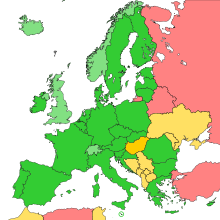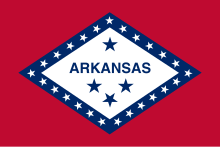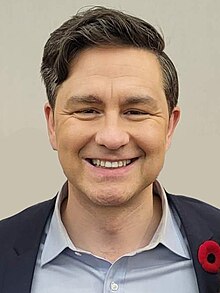Portal:Politics
| Main | Topics and categories | Tasks and projects |
The Politics portal
Politics (from Ancient Greek πολιτικά (politiká) 'affairs of the cities') is the set of activities that are associated with making decisions in groups, or other forms of power relations among individuals, such as the distribution of resources or status. The branch of social science that studies politics and government is referred to as political science.
It may be used positively in the context of a "political solution" which is compromising and non-violent, or descriptively as "the art or science of government", but also often carries a negative connotation. The concept has been defined in various ways, and different approaches have fundamentally differing views on whether it should be used extensively or in a limited way, empirically or normatively, and on whether conflict or co-operation is more essential to it.
A variety of methods are deployed in politics, which include promoting one's own political views among people, negotiation with other political subjects, making laws, and exercising internal and external force, including warfare against adversaries. Politics is exercised on a wide range of social levels, from clans and tribes of traditional societies, through modern local governments, companies and institutions up to sovereign states, to the international level.
In modern nation states, people often form political parties to represent their ideas. Members of a party often agree to take the same position on many issues and agree to support the same changes to law and the same leaders. An election is usually a competition between different parties.
A political system is a framework which defines acceptable political methods within a society. The history of political thought can be traced back to early antiquity, with seminal works such as Plato's Republic, Aristotle's Politics, Confucius's political manuscripts and Chanakya's Arthashastra. (Full article...)
Selected article
The Hungarian Revolution of 1956 was a spontaneous nationwide revolt against the Neo-Stalinist government of Hungary and its Soviet-imposed policies, lasting from 23 October until 10 November 1956. It began as a student demonstration which attracted thousands as it marched through central Budapest to the Parliament building. The revolt spread quickly across Hungary, and the government fell. Thousands organized into militias, battling the State police force and Soviet troops. The new government formally disbanded the State police force, declared its intention to withdraw from the Warsaw Pact and pledged to re-establish free elections. On 4 November, a large Soviet force invaded Budapest using artillery and air strikes, killing thousands of civilians. Organized resistance ceased by 10 November 1956, and mass arrests began. An estimated 200,000 Hungarians fled as refugees. By January 1957 the new Soviet-installed government had suppressed all public opposition. Soviet actions alienated many Western Marxists, yet strengthened Soviet control over Eastern Europe, cultivating the perception that communism was both irreversible and monolithic. Public discussion about this revolution was suppressed in Hungary for over 30 years, but since the thaw of the 1980s it has been a subject of intense study and debate.
Featured picture

Located in Victoria, British Columbia, Canada, and officially opened in 1898 with a 500 feet (150 m) long facade, central dome, two end pavilions, and a gold-covered statue of Captain George Vancouver, the British Columbia Parliament Buildings are home to the Legislative Assembly of British Columbia.
Selected quote
Selected biography
Phạm Ngọc Thảo (1922–1965), a major provincial leader in South Vietnam and infiltrator of the Army of the Republic of Vietnam (ARVN), was a communist agent of the Viet Minh and later the Vietnam People's Army. As the overseer of Ngô Đình Nhu's Strategic Hamlet Program in the early 1960s, he deliberately forced the program forward at unsustainable speeds, constructing poorly equipped and poorly defended villages, in order to foster rural resentment against the regime of President Ngo Dinh Diem, Nhu's elder brother. Thao was posthumously promoted by the ARVN to the rank of one-star general and awarded the title of Heroic war dead (Vietnamese: Liệt sĩ). After the Fall of Saigon and the end of the Vietnam War, the communist government awarded him the same title and paid war pensions to his family, claiming him as one of their own.
Did you know (auto-generated) -

- ... that as part of its strategy of political renovation, National Convergence nominated a librarian to contest one of Bolivia's most competitive legislative districts?
- ... that although he was a former Indonesian prime minister, Soekiman Wirjosandjojo was not arrested during a political purge as he was considered a non-threat?
- ... that an excavation for 75 Wall Street revealed an old crock linked with a leader of the Tammany Hall political machine?
- ... that Rabab Al-Kadhimi was threatened with deportation from Egypt due to the political nature of her poetry?
- ... that before she was elected to the Parliament of Armenia, Maria Karapetyan spray-painted political graffiti on the streets of Yerevan in support of Nikol Pashinyan?
- ... that despite most of the polls and 50 major political writers predicting victory for Thomas E. Dewey, Harry S. Truman won the 1948 presidential election?
More did you know...
- ...that the 2010 Bihar legislative assembly election takes place across six phases and over one month?
- ...that politicians discuss the ways in which they and their families have suffered because of Oprahization?
- ...that Democratic and Republican plans for the 2012 United States federal budget both focus on deficit reduction, but differ in their changes to taxation, entitlement programs, and research funding?
- ...that Conservative Party candidate Bernard Trottier won a seat in the 41st Canadian Parliament by defeating the incumbent Leader of the Liberal Party of Canada in the 2011 federal election?
- ...that Nunez Community College in Chalmette, Louisiana, is named for the late wife of former Louisiana State Senate President Samuel B. Nunez, Jr.?
- ...that the 2013 United States federal budget may impose a 23% cut on the defense budget due to the Budget Control Act of 2011, according to Secretary of Defense Leon Panetta?
In this month
- June 28, 2004 - Canadian federal elections occur; the Liberal party loses its absolute majority.
News and Current events
- August 11: 4 local government areas in New South Wales, Australia locked down after COVID-19 case
- August 11: Australia: AstraZeneca vaccine access expanded by Victorian government
- August 1: Australia: Victorian lockdown lifted
- July 29: Tunisia's president dismisses prime minister, suspends parliament
- July 25: Australia: Wikinews interviews Reg Kidd, mayor of the City of Orange, about COVID-19 lockdown and local government
- July 23: South Australia enters week-long lockdown to contain COVID-19 Delta variant spread
- July 21: Technological University Dublin senior lecturer Dr Lorcan Sirr speaks to Wikinews on housing market in Ireland
- July 21: Three rural councils in New South Wales, Australia enter 7-day lockdown
- July 21: Australia: Victoria lockdown extended by a week with 85 active cases recorded
- July 15: California governor signs new state budget, eligible Californians to get stimulus payments
Topics and categories
General images
Related portals
Associated Wikimedia
The following Wikimedia Foundation sister projects provide more on this subject:
-
Commons
Free media repository -
Wikibooks
Free textbooks and manuals -
Wikidata
Free knowledge base -
Wikinews
Free-content news -
Wikiquote
Collection of quotations -
Wikisource
Free-content library -
Wikiversity
Free learning tools -
Wiktionary
Dictionary and thesaurus


























































